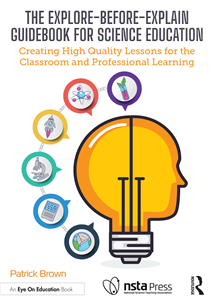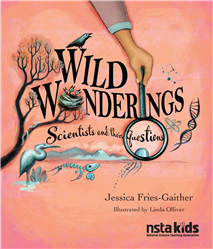All Pedagogy resources
NSTA Press Book
This guidebook uses an Explore-before-Explain instructional sequence to help you facilitate the design of active meaning-making lessons in science....
By Patrick Brown
NSTA Press Book
Wild Wonderings: Scientists and Their Questions
Click here to view video of Wild Wonderings Let your curiosity run wild! This lively book will inspire you to ask questions like scientists do. Why? Because questions can lead you to amazing discoveries. Like what? Like when theoretical physicist ...
By Jessica Fries-Gaither
NSTA Kids
Wild Wonderings: Scientists and Their Questions
Click here to view video of Wild Wonderings Let your curiosity run wild! This lively book will inspire you to ask questions like scientists do. Why? Because questions can lead you to amazing discoveries. Like what? Like when theoretical physicist ...
Journal Article
Using Group Roles to Promote Collaboration
Collaborating effectively in small groups is an important skill for students, especially in classrooms adopting science education reforms like the NGSS, but it is also an extremely challenging skill. In this article, I share how I use group roles as ...
By Marta Stoeckel
Journal Article
Direct experiences in the living world are a major ally in helping students understand biology and the practice of science, and in fostering a lifelong love for nature. The positive impact of field study on students’ experiences and outcomes, and t...
By Barry McPhail
Journal Article
Powerful Practices for the Differentiated Science Classroom
At its core, differentiation stems from the recognition that individual learners arrive in classrooms, each day, with a wide range of knowledge, lived experiences, abilities, ways of thinking, curiosities, and dispositions. Differentiation challenges...
By Brooke Whitworth, Amy Snead
Journal Article
Increased Pre-Lecture Reading and Greater Attendance at a Community College Gateway Science Course
Gateway science courses are an ongoing obstacle to recruitment into STEM fields (Science, Technology, Engineering, and Mathematics). Students come to these courses with a high cognitive load, making success in the course challenging. Instructional de...
By Daniel Gertner, Allie Brashears, Na Xu, Holly Porter-Morgan
Journal Article
Evidence-based pedagogies to improve STEM student success are now recognized, but their successful incorporation can be hampered by STEM faculty wariness of novel pedagogical research. To support these pedagogies’ effective implementation, a resear...
By Nisaa Kirtman, Cary Smith, Teresa Demeritte, Debra Divinity, Vida Amouzandeh, Jo Anne Fordham, Mehri Fadavi
Journal Article
As introductory college science courses transition from large, passive lectures to more student-centered active learning environments, additional instructional support may be needed. Peer Learning Assistants (PLAs) can aid course transformations by h...
By Brittney Ferrari, Peyton LaBonte, Julie Kittleson
Journal Article
Teaching Physics as the Awesome Rules of Nature
Focus on Physics...
By Paul G. Hewitt
Journal Article
Cultivating Teachers’ Indigenous Knowledge through Explorations of Milkweed and Phenology
Providing more equitable pedagogies to all students, including those who are traditionally underrepresented, is a high priority of science education. In this paper, we outline how we coupled Indigenous Ways of Knowing with investigations about plant ...
By Hillary Barron, Emily Mohl, Michele Koomen
Journal Article
For preservice K–5 teachers, understanding how to implement phenomenon-based learning in an elementary classroom is an important skill, particularly as it relates to integrating the Next Generation Science Standards. This article presents one way t...
By Steph Dean
Journal Article
This study summarizes the comparison of interactive lecturing and technology-supported student-centered pedagogy across six semesters of an introductory physical geology course. A multiple linear regression analysis of 967 student scores shows that a...
By Theresa Halligan, Cinzia Cervato, Ulrike Genschel
Journal Article
Students’ academic performance improves when they use active study methods and discussion of study strategy efficacy can impact students’ choice. Faculty often employ mid-semester wrappers to encourage student reflection on their study habits, so...
By Maya Sobel, Linden Higgins





